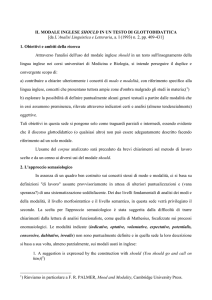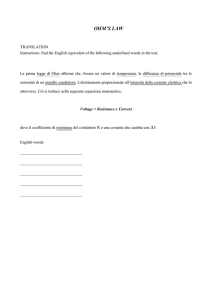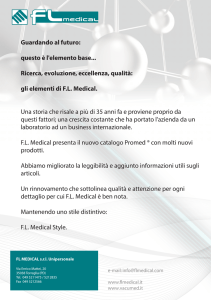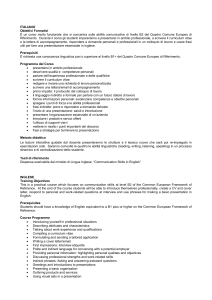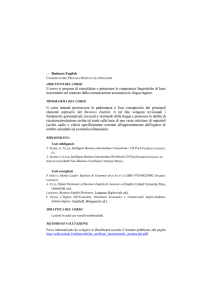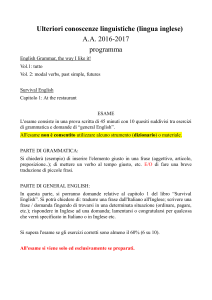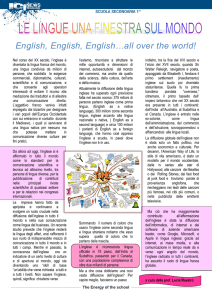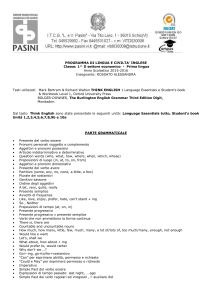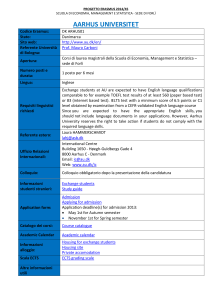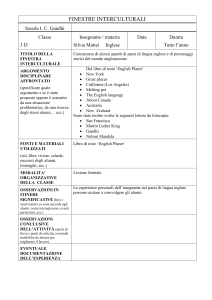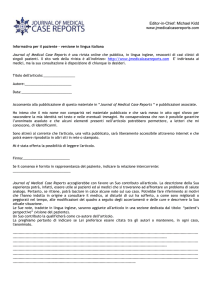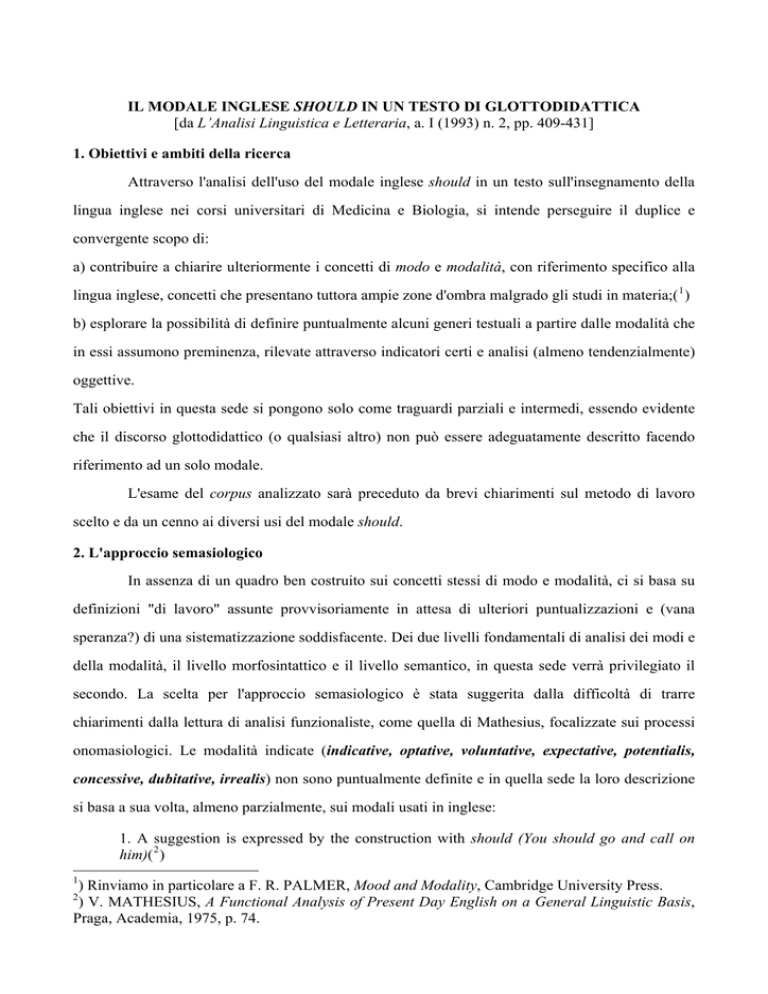
IL MODALE INGLESE SHOULD IN UN TESTO DI GLOTTODIDATTICA
[da L’Analisi Linguistica e Letteraria, a. I (1993) n. 2, pp. 409-431]
1. Obiettivi e ambiti della ricerca
Attraverso l'analisi dell'uso del modale inglese should in un testo sull'insegnamento della
lingua inglese nei corsi universitari di Medicina e Biologia, si intende perseguire il duplice e
convergente scopo di:
a) contribuire a chiarire ulteriormente i concetti di modo e modalità, con riferimento specifico alla
lingua inglese, concetti che presentano tuttora ampie zone d'ombra malgrado gli studi in materia;( 1 )
b) esplorare la possibilità di definire puntualmente alcuni generi testuali a partire dalle modalità che
in essi assumono preminenza, rilevate attraverso indicatori certi e analisi (almeno tendenzialmente)
oggettive.
Tali obiettivi in questa sede si pongono solo come traguardi parziali e intermedi, essendo evidente
che il discorso glottodidattico (o qualsiasi altro) non può essere adeguatamente descritto facendo
riferimento ad un solo modale.
L'esame del corpus analizzato sarà preceduto da brevi chiarimenti sul metodo di lavoro
scelto e da un cenno ai diversi usi del modale should.
2. L'approccio semasiologico
In assenza di un quadro ben costruito sui concetti stessi di modo e modalità, ci si basa su
definizioni "di lavoro" assunte provvisoriamente in attesa di ulteriori puntualizzazioni e (vana
speranza?) di una sistematizzazione soddisfacente. Dei due livelli fondamentali di analisi dei modi e
della modalità, il livello morfosintattico e il livello semantico, in questa sede verrà privilegiato il
secondo. La scelta per l'approccio semasiologico è stata suggerita dalla difficoltà di trarre
chiarimenti dalla lettura di analisi funzionaliste, come quella di Mathesius, focalizzate sui processi
onomasiologici. Le modalità indicate (indicative, optative, voluntative, expectative, potentialis,
concessive, dubitative, irrealis) non sono puntualmente definite e in quella sede la loro descrizione
si basa a sua volta, almeno parzialmente, sui modali usati in inglese:
1. A suggestion is expressed by the construction with should (You should go and call on
him)( 2 )
1
) Rinviamo in particolare a F. R. PALMER, Mood and Modality, Cambridge University Press.
) V. MATHESIUS, A Functional Analysis of Present Day English on a General Linguistic Basis,
Praga, Academia, 1975, p. 74.
2
2
In qualche caso la traduzione inglese fa risultare circolare e tautologico un testo che
nell'originale cèco è presumibilmente più chiaro:
2. In a similar manner English expresses a conviction that something ought to be, but is not,
viz. by the verb ought to (He ought to know that).( 3 )
3. Gli usi del modale should
Privilegiato quindi un approccio strettamente semasiologico, la scelta è caduta su should
sia per la ricchezza delle sue valenze soprattutto nell'ambito della modalità deontica, sia per
utilizzare una base di dati di una certa consistenza che consentirà, sperabilmente, di formulare
qualche rilievo non del tutto scontato. Nell'opera di Mathesius, come del resto nella quasi totalità
dei testi di linguistica applicata, dei dizionari e dei manuali, si introduce il discorso su should a
partire da quello che appare essere il suo valore più 'normale' e frequente, ossia di modale usato per
dare suggerimenti e consigli: normalità e frequenza che qui saranno messe in discussione, almeno
per quanto riguarda certi tipi di testi, nei quali i casi in cui a should corrisponde in italiano una
forma del condizionale presente di dovere sono una minoranza.
Nell'altro passo del suo volume in cui si occupa di should, Mathesius osserva:
3. Should expresses a subjective point of view, e.g. It is strange that the civil war in Spain
should have lasted so long. The subordinate clause denotes a fact, but if we wish to colour it
subjectively, for instance to express that we find this fact startling, we employ the
expression should. The fact itself remains unchanged, only the subjective viewpoint of the
speaker is emphasized.( 4 )
Si tratta di quello che i grammatologi inglesi più recenti chiamano 'should putativo'( 5 ) e
che Jespersen aveva già segnalato oltre sessant'anni fa come caso degno di nota:
4. What would be thought of a painter who should mix August and January in one
picture?( 6 ))
Anche qui il dipingere agosto e gennaio assieme è un fatto che non viene posto in discussione e
should è una marca di atteggiamento del parlante. I pochi esempi finora visti sono già sufficienti per
segnalarci che pensare a should come passato di shall – o comunque come ausiliare del tempo
3
) Ibid. Si noti la presenza del definiendum ought to come parola-chiave della definizione.
) Ibid., p. 172.
5
) R. QUIRK, S. GREENBAUM, G. LEECH, J. SVARTVIK, A Comprehensive Grammar of the
English Language, Londra, Longman, 1985.
6
) O. JESPERSEN, Essentials of English Grammar, Londra, Allen & Unwin, 1933, p. 287.
4
3
passato – è fuorviante. La maggior parte degli esempi ci mostra come il più delle volte should sia
associato a un riferimento al presente o al futuro. Quando è usato per dare consigli, come in:
5. You should see a doctor,( 7 )
l'azione espressa dal verbo principale (nell'esempio, farsi visitare da un dottore) è sempre
necessariamente proiettata nel futuro, anche se questo può essere immediato, come in:
6. If he doesn't want to miss the plane, he should leave at once.
Il caso di should have + V è diverso; oltre che per riferimenti a eventi passati percepiti come strani
o insoliti, come nell'esempio n. 3, should have è usato per indicare che nel passato non è avvenuto
qualcosa che sarebbe stato necessario, opportuno o in qualche modo desiderabile:
7. John's missed the plane? He should have left earlier!
In questo caso la necessità/opportunità riguarda il soggetto della frase; altrove la desiderabilità può
riferirsi alla strategia narrativa del locutore:
8. If you call this a storm, you should have seen when I doubled Cape Horn!
Nel seguito ci occuperemo solo della "forma semplice" di should, che è l'unica presente nella
raccolta di testi esaminata, non essendovi alcun esempio di should have seguito dal past participle
del verbo principale.
In chiave comparativa, sono frequenti i casi in cui should viene reso in italiano con un
indicativo:
9. You use should in questions when you are asking someone for advice, permission,
information, etc. Who should I see about my teaching programme?( 8 )
o con perifrasi che rendono in qualche modo l'atteggiamento del parlante - nel seguente esempio,
l'idea di sorpresa:
10. Should is used [...] when you are emphasizing that something is very surprising. 'Who
should I meet on the plane but Colin Harper'-'Gosh, really?'( 9 )
Qui siamo chiaramente nell'ambito della modalità epistemica. Il più delle volte, soprattutto
dopo le congiunzioni if e that, il traducente italiano più appropriato è il congiuntivo presente o
imperfetto del verbo principale:
7
) J. LYONS, Introduzione alla linguistica teorica: II. La grammatica, Bari, Laterza, 1978, p. 408.
) J.McH. SINCLAIR (cur.), COBUILD: Collins Birmingham University International Language
Database, Londra, Collins, 1987: " Con chi mi devo incontrare..."
9
) Ibid.: "E chi mi càpita di incontrare in aereo se non..."
8
4
11. If I should die, think only this of me:
That there's some corner of a foreign field
That is forever England.( 10 )
Non intendiamo affrontare gli aspetti diacronici, ma certamente questi valori di should erano
presenti (e forse ancor più diffusi di oggi) nell'inglese elisabettiano:
12. It is not good that the man should be alone.( 11 )
13. That it should come to this!( 12 )
Nei testi di tipo argomentativo non mancano esempi in cui il significato di should si avvicina
abbastanza a quello di dovrebbe:
14. Such an approach integrates theory and research into the nature of language learning and
use, with insights derived from the observation and analysis of what actually goes on in
classrooms (as opposed to what some say should go on).( 13 )
Più spesso, tuttavia, l'intenzione comunicativa complessiva porta a privilegiare altre interpretazioni.
Nella sua analisi della modalità deontica nell'inglese della medicina, M. Ibba esamina la
Dichiarazione di Helsinki sulla ricerca clinica sull'uomo (1964). In essa should compare in alcuni
punti fondamentali:
15. The design and performance of each experimental procedure involving human subjects
should be clearly formulated in an experimental protocol which should be transmitted to a
specially appointed independent committee for consideration, comment and guidance.( 14 )
Sembra indiscutibile che non si tratta di una normativa che un medico-ricercatore dovrebbe
rispettare se gli garba, ma di regole che devono essere seguite per non violare i principi a cui si
ispira la Dichiarazione. Questa, d'altra parte, chiarisce esplicitamente, nell'introduzione che precede
i Principles, il suo carattere di documento vincolante. E che qui should sia altrettanto categorico di
must( 15 ) pare confermato dal capoverso seguente, in cui ricorrono entrambi i modali:
16. Biomedical research involving human subjects should be conducted only by
scientifically qualified persons and under the supervision of a clinically competent medical
10
) R. BROOKE (1887-1915), The Soldier.
) Genesi 2,18, Authorized Version (1611).
12
) W. SHAKESPEARE, Hamlet, Act 1, Sc. 2, cit. da O. JESPERSEN che parla di emotional should
(Essentials..., cit., p. 288).
13
) D. NUNAN, Language Teaching Methodology, New York, Prentice Hall, 1991, p. 1.
14
) M. IBBA, L'inglese della medicina, Milano, Vita e Pensiero, 1988, p. 128.
15
) Opinione condivisa da M. Ibba, cfr. p. 131, nota.
11
5
person. The responsibility for the human subject must always rest with a medically qualified
person...( 16 )
4. Il corpus
La presente analisi di should è condotta su una raccolta di saggi, tuttora inediti,
sull'insegnamento dell'inglese nelle facoltà mediche; ne riportiamo l'indice provvisorio:
M. Ibba "A turning point in Italian higher education: foreign languages challenge the medical
faculties"
R. Howard "Teaching medical English vocabulary systematically"
L. Anderson "Approaches to context-based vocabulary learning in English for medical purposes"
M. Ulrych "Lexical aspects of medical discourse: an Italian perspective"
J. Maclean "English for medical congress"
G. Ferguson "Case conference materials in the teaching of medical English"
A. Murray "It's in the News - Interactive Procedures Using Non-Specialist Texts"
M. D'Albora Calabrese "A case study in ESP"
J. Rees Franzinetti "English for medical purposes"
B. L. Gunnarsson "Pragmatic and macro thematic patterns in science and popular science: a
diachronic study of articles from three fields" ( 17 )
Tutti i testi tranne l'ultimo sono saggi redatti per la pubblicazione in un reader di
argomento glottodidattico. L'ultimo è il testo di una conferenza tenuta dall'autrice, non rivisto per la
pubblicazione a stampa; si tratta quindi di un esempio di "orale in forma scritta." Si è deciso di
includerlo nel corpus, malgrado tale disomogeneità rispetto agli altri, perché offre la possibilità di
ulteriori osservazioni sullo stile di presentazione dell'argomentazione metodologico-didattica. Gli
autori sono in parte di madrelingua inglese, in parte studiosi con dottorato di ricerca conseguito in
università britanniche o americane; tutti i testi di autori non nativi sono stati rivisti da persone di
16
) Ibid., p. 128.
) Ai saggi si aggiungono l'introduzione, la presentazione degli autori e la bibliografia generale.
Abbiamo preferito escludere queste parti per rendere il corpus più omogeneo. Ringraziamo la
curatrice, la prof. M. Ibba della Facoltà di Medicina dell'Università Cattolica, per aver consentito
l'utilizzazione dei testi e per averceli resi disponibili su supporto informatico. Può essere utile un
cenno tecnico alla strumentazione che ha consentito di elaborare più agevolmente il corpus. Ci
siamo serviti di una versione avanzata di TACT 1.26, capace di utilizzare la memoria estesa
(TACTEMS), cortesemente fornitaci dal Dept. of Computing in the Humanities dell'Università di
Toronto e funzionante sotto MS-DOS 5.00 in un personal computer con processore 386.
17
6
madrelingua inglese e costituiscono quindi un repertorio affidabile sotto il profilo della
"autenticità".
Il corpus consiste di circa 115 cartelle per un totale di 43491 parole (nel senso di
occorrenze o tokens) complessive;( 18 ) should (una delle 5866 forme o types) appare 61 volte.( 19 )
Nel seguito, per brevità useremo corpus per indicare l'intera raccolta, e selezione per l'insieme dei
paragrafi che contengono should; la selezione è riportata per intero negli esempi che seguono, dal n.
17 al n. 71.
5. Analisi della selezione
Ad un primo esame complessivo si evidenziano due tipi di enunciati:
- quelli nei quali si esplica soprattutto, in forme diverse, la modalità epistemica: in essi should è
associato ad espressioni in cui l'autore attira l'attenzione su qualche aspetto specifico del suo
discorso o esprime un atteggiamento particolare nei confronti di ciò che afferma;
- quelli in cui should introduce ciò che il docente deve fare se vuole che la sua didassi sia conforme
a quanto indicato dagli esiti delle ricerche e delle esperienze condotte dagli autori (modalità
deontica).
5.1 "Si noti che..."
Nell'ambito del primo tipo, un primo gruppo di esempi comprende espressioni di carattere
euristico e/o didattico corrispondenti alle forme italiane si noti, sia ben chiaro, occorre ricordare e
simili:
17. From the description given above of what happens in medical congresses, it should be
clear that the answer to this question must be: intelligibility, i.e. to understand others and be
understood.
18. Second, it should be kept in mind that in a class with a shared first language teacher-led
work in pronunciation will be needed even when there is mutual understanding.
19. The use of modals, such as may, might, and could, is another common feature of
scientific prose. It should be pointed out that if the writer of a paper has an element of doubt,
he/she uses the form may, might, etc., rather than commit him/herself rashly.
18
) Le cifre globali sono da ritenere approssimative; il sistema usato, ad esempio, conta come unità
anche le lettere che introducono le elencazioni: a), b), c)... Questo, per restare nell'esempio, rende
inaffidabile il dato grezzo sull'articolo a.
19
) Indichiamo a titolo orientativo le frequenze degli altri modali nel corpus: can/cannot 170; could
13; may 139; might 12; will 97; would 42; shall 5.
7
20. It should be emphasised that unlike some of the students, they [= doctors] are well aware
of their need for English in their professional activities.
Si noti in tutti e quattro i casi il soggetto it: la "spersonalizzazione" è un punto che riprenderemo tra
poco.
Un secondo gruppo di espressioni comprende le marche di atteggiamento, soprattutto le
forme di attenuazione delle proprie affermazioni, ed alcuni elementi di transizione come ora vorrei
parlare di... con l'effetto combinato di should e del verbo like:
21. In this paper I should like to describe a situation in which the use of popularised versions
of medical articles does seem appropriate and refute the idea that in these circumstances it
represents a "cop-out" on the part of the teacher.( 20 )
22. I should now like to describe one situation in which we at the Institute for Applied
Language Studies, University of Edinburgh, make use of popularised medical texts.
23. Scientific articles have become more purely scientific, in the positivistic science
tradition I should add.
Qui viene aggiunto un direi / aggiungerei come integrazione del preciso richiamo al filone
positivista del far scienza. Nel passo successivo should è usato per esprimere la cautela da usare
nell'interpretare i suggerimenti del metodologo:
24. Because discussion in this area is so dependent on clinical knowledge and experience, it
has to be said that case conference material is less suitable for medical students, especially
those at a pre-clinical stage. This cautionary recommendation should not be regarded as
absolutely prohibitive, however, for there is some scope for adapting the use of the material
to the situation of the medical student in the later years of study.
Si noti it has to be said come forma alternativa analoga a it should be said, e si veda infra, al n. 30,
this should suffice.
Infine troviamo should in passi nei quali gli autori fanno riferimento a circostanze in
qualche misura esterne al discorso metodologico-didattico vero e proprio - le collaborazioni,
l'ambiente di lavoro, i possibili sviluppi; il primo esempio riguarda un doveroso riconoscimento
dell'apporto dei colleghi:
25. I am greatly indebted to my colleagues Joan Maclean and Dr. Ron Howard for
comments in relation to this paper. I should also point out that it is they who have initiated
the development of many of the teaching procedures described here.
Il secondo esempio esprime un auspicio e una proposta:
20
) E' appena il caso di ricordare che I should like è l'abituale traducente di vorrei: molto raramente
want è usato con should/ would, e in quei pochi casi di solito want non sta per 'volere' ma per 'aver
bisogno di, occorrere'.
8
26. It's our hope that the work that is being carried out in our Institution will be useful for
other Institutions as well, due, most of all, to the many mutually shared skill areas. This
should happen at least during this transition period which doesn't promise to be a very short
one.
Troviamo poi ancora should retto da if per descrivere un'eventualità:
27. The Colleagues who share my professional concern are kindly invited to share their
insights and expertise as well, for it would be seriously uneconomical, and service delaying,
if each of us should start from zero, multiplying efforts, mistakes and small discovery steps.
5.2 "Il corso di inglese medico deve..."
Iniziamo ora l'analisi dei passi del secondo tipo, ove should concorre a formulare i 'precetti
didattici'( 21 ); prenderemo le mosse dai periodi in cui troviamo altre forme che esprimono la
modalità deontica e/o aletica:
28. A further point to be taken into account is that the lexical difficulties a learner has to
face may differ in relation to their L1. [...] This supports the view currently held in wider
foreign language circles in Italy that EFL textbooks should be "country specific". In other
words, they should take into account the similarities and differences that exist between
learners' L1 and L2 with a view to dealing more effectively with relevant problem areas.
Nell'esempio, e in vari altri casi che seguono, una forma parallela ed alternativa a should è il verbo
to be seguito dal participio passato: si confrontino to be taken into account e should take into
account.
29. Which 500 words are to be taught must be established by individual teachers, perhaps
with reference to published word frequency lists, but whatever they are I recommend that as
far as possible they should be grouped according to meaning, in semantic sets.
Anche qui abbiamo are to be simmetrico con should be; vediamo ora esempi in cui should
è collegato in vari modi con need (sostantivo o verbo) e altre forme che esprimono la necessità:
30. Although these groups are simply mentioned, this should suffice to provide an idea of
the broad, sharply diversified spectrum of curricula that need to be designed, in order to
properly serve the learner population of our Institution.
31. A needs analysis of the students shows that at the end of the English course, they should
at least be able to read a medical text.
L'analisi dei bisogni e la definizione degli obiettivi sono temi centrali di una didattica impostata su
basi curricolari.
21
) Ci sarebbe molto da dire sul discorso glottodidattico, sugli atteggiamenti descrittivi e non
prescrittivi dei buoni metodologi, ecc., ma in questa sede gli approfondimenti in tale direzione ci
porterebbero fuori tema.
9
32. Students, at least of the lower levels, need a list of the principal false cognates, and
whenever others appear in the text they should, naturally, be pointed out - if possible during
the pre-reading course with elementary students.
33. The possession of accurate, objective information about the learner, his specialisation
and his needs, enables the course planner to narrow down the area of language use and
usage, - and of course the mode, spoken or written, - from which the linguistic items in
communicative patterns of language use should be drawn.
34. If the language level of the group makes the use of target-level activities quite
impossible, then it will be necessary to provide a series of graded activities leading up to the
target activities. The target activity should then be attempted as soon as it is within reach and that is much sooner than on a more conventional course.
Si noti in (34) il parallelismo tra If...then it will be necessary e should then. Vi sono casi
interessanti in cui le espressioni di modalità si sommano e combinano in vari modi:
35. ...the cost-benefit balance dictates that the emphasis should be on the repeated
meaningful practice of an essential minimum of phrases, rather than studying a rich
repertoire of gambits.
Il verbo dictates obbliga all'uso di should; allo stesso gruppo appartengono altri verbi,
come require e analogamente si comportano, in qualche caso, i verbi del gruppo di suggest,
recommend, ecc.( 22 )
Come traducente di "dictates that the emphasis should be" in italiano abbiamo impone che
si ponga l'accento, con l'uso del congiuntivo o alternativamente di un deve: qui l'uso di dovrebbe
come traducente di should è escluso, non essendo accettabile *impone che si dovrebbe.
36. Other members of the set are: fat, stout, plump, tubby, chubby, flabby, corpulent,
overweight, rotund. Of these fat, overweight, plump and stout are useful. But the other
words are not common in medicine and the temptation to include them, for the sake of
completeness should probably be resisted.
Qui troviamo probably accanto a should e si profilano le ulteriori complessità che
emergono quando si estende l'esame alle modalità combinate e ai processi di hedging. Nei prossimi
due esempi troviamo theoretically e ideally:
37. A language teacher of the present era theoretically should not wonder whether the
learners are motivated to learn a foreign language or not.
22
) La Collins COBUILD English Grammar afferma che quando qualcuno esprime una proposta o
un suggerimento a proposito di ciò che qualcuno, diverso dall'interlocutore, dovrebbe fare, ricorre al
discorso indiretto usando una proposizione retta da that; tale proposizione contiene spesso un
modale, che di solito è should: "He proposes that the Government should hold an inquiry." L'elenco
dei reporting verbs usati in questo costrutto è: advise agree ask beg command decree demand direct
insist intend order plead pray prefer propose recommend request rule stipulate suggest urge, ai
quali aggiungiamo dictate. Collins COBUILD English Grammar, p. 325.
10
La presenza di una "siepe" come theoretically comporta un'attenuazione del deontico verso
l'epistemico.
38. Given these demands, a course of English for medical congresses should ideally aim at
producing a native- speaker-like ability in speaking and listening. But this ideal is
unrealistic.
In (38) abbiamo un dovrebbe dell'irrealtà, marcata da ideally e da unrealistic della proposizione
successiva.
A volte è un verbo principale come suggest (proporre, indicare) che orienta il lettore sul
valore da attribuire a should:
39. To summarise so far, I suggest that learners coming from General English classes should
be systematically taught about 500 words which are more common in medicine than in
general English.
40. It is suggested that real beginners should - if they have time - repeat the English course
in the faculty for two years, and study during their holidays or when they are free, between
the first and second year.
Vi sono casi in cui l'obiettivo da perseguire è associato a ciò che lo studente deve sapere o
saper fare e quindi si ha la co-occorrenza di espressioni che rientrano nella sfera di "potere" nel
senso di "essere capace". Abbiamo già visto un esempio al n. 31.
41. The Advanced and Upper Intermediate level students should be able to infer or
understand information not specifically stated, and extrapolate the main points in order to be
able to summarize the main concepts in the text.
Nella maggioranza degli esempi tratti dai testi specialistici should è seguito da be +
participio passato: così al n. 15 (due volte: The design [...] should be clearly formulated in an
experimental protocol which should be transmitted...) e al n. 16 (Biomedical research [...] should be
conducted...). Altri esempi:
42. The words deleted by the teacher should, of course, be carefully chosen to permit a focus
on pre-determined language points, and in this respect be constitutive of a teaching rather
than testing exercise.
43. Grammatical errors tend to have less effect on intelligibility than pronunciation and
should be given correspondingly less attention.
44. Accessibility: The main points of the text should be expressed in a form that is
accessible to the non- native reader, i.e. they should not be hidden in a jungle of
colloquialisms, figurative language, or culture-specific references.
45. Should vocabulary be taught systematically?
11
46. What words should be taught systematically?( 23 )
47. Words from all three of these groups should be included in systematic vocabulary
teaching.
48. As a noun line has at least 39 meanings (Procter 1978:636-7) and a number of these are
common in medicine. How many meanings should be taught?
49. Initially, learners should be encouraged to stick to those compound terms that are
already accepted as established forms within medical discourse.
50. As for a text suitable second year students concerning diet and health, students could be
asked what warning or advice a patient or the general public should be given.
51. Some vocabulary, particularly the most common medical terminology, should be
pretaught.
52. Further reading strategies should be given to Elementary and Intermediate courses such
as the use of semantic signals, e.g. anaphoric and cataphoric references, in order to link the
two without repetition of the same word. Awareness of synonyms and antonyms, the use of
prefixes and suffixes also help the learner to decode and interpret the syntax by deduction.
53. It is this kind of analysis that will lead to a correct formulation of the objectives of the
course, which should be centered around the primary language skills (listening, speaking,
reading, and writing) according to the particular situation.
54. In ESP as ELT the above-mentioned skills should be integrated. What happens in reality
is that, due to lack of time or facilities or appropriate materials, some are more favoured
than others.
Il richiamo a ciò che avviene nella realtà, in reality, ha valore analogo all'uso di probably,
theoretically e ideally ai nn. 36-38.
55. In order to teach a student how to understand the meaning of a passage, certain reading
strategies are essential. It should be pointed out that the techniques that we automatically
use in reading in our mother tongue can and should be transferred to reading in a foreign
tongue (this is at least valid when the European languages are involved).
Nel passo troviamo should due volte (la seconda abbinato a can), ad illustrazione di entrambe le
modalità principali (occorre sottolineare e le tecniche... devono essere trasferite))
Avevamo già trovato esempi di should be + part. pass. al n. 29 (words [...] should be
grouped..); ...); al n. 32 (they should, naturally, be pointed out); al n. 33 (items [...] should be
drawn); al n. 34 (The target activity should then be attempted...); al n. 36 (the temptation [...] should
probably be resisted); al n. 39 (classes should be systematically taught...).
23
) Gli esempi (45) e (46) sono titoli di paragrafi.
12
6. Strategie discorsuali
Questa preferenza per la diatesi passiva illustra e conferma un tratto del linguaggio
specialistico detto spersonalizzazione: il fuoco dell'attenzione non è su chi compie l'azione (nel caso
in esame, l'insegnante) ma su ciò che viene compiuto. In inglese il passivo deagentivato è lo
strumento di spersonalizzazione più frequente.
Ad esso si ricorre anche nelle espressioni riportate ai nn. 18 e segg. Nel momento stesso in
cui gli autori richiamano l'attenzione su alcuni punti, attuano una presa di distanze così da
presentare quei punti come oggettivamente (e non soggettivamente) degni di nota. Come già
osservato, e a differenza degli esempi appena riportati, ivi il soggetto è spesso it:
18. ...it should be kept in mind...
19. It should be pointed out...
20. It should be emphasised...
Per dare un'idea dell'incidenza della spersonalizzazione, diremo che nel corpus troviamo
76 occorrenze del pronome I e 80 di we. Se si escludono i 45 I e i 49 we dell'ultimo testo che, si
ricorderà, è la trascrizione non rielaborata di una conferenza, risultano solo 62 pronomi soggetto di
prima persona sul totale di oltre 43.000 parole. Nella sola selezione i casi di spersonalizzazione
sono già più numerosi.
Si è detto che nel corpus should è usato soprattutto per indicare ciò che l'insegnante deve
fare per tener conto delle indicazioni metodologico-didattiche elaborate dagli autori. Peraltro il
verbo teach è usato solo due volte e il sostantivo teacher/s compare solo otto volte nei paragrafi in
cui si trova anche should:
in (18) e (21) teacher non è soggetto e should non ha valore deontico;
ai nn. 29 e 42 teacher è esplicitato come complemento di agente; in entrambi i casi il soggetto è
words;
In (56) le correzioni operate dall'insegnante si interpongono tra teacher e should:
56. The informality of Procedures Three and Four allow the teacher to do on the spot
corrections, but these should not have the effect of diverting attention away from the
message to the language. In other words it is not appropriate here to use correction
techniques which attempt to obtain the correction from the student himself, unless...
Notiamo per inciso come le espressioni should not have the effect e it is not appropriate here
rinviano alla stessa strategia argomentativa.
13
Solo tre volte, tutte e tre nello stesso saggio, abbiamo teacher/s come soggetto di should: al
n. 37 già visto, e in (57, 58):
57. Hence the English language teacher who is entrusted with his type of student population
at University should not interpret the law literally, setting out to teach an "English Language
Course with scientific/medical orientation... pertinent to the subject matter and to the
problems of the course of studies for the medical degree", without taking into account the
heterogeneous English language proficiency of the student population.
58. It might sound like saying that a good teacher of English for specific medical purposes
should also be some sort of "Jack of all (medical) trades".
Il participio passato taught ricorre sei volte (ivi compresa la forma derivata pretaught).
Nella maggior parte dei casi si usano quindi verbi diversi, che tuttavia rinviano ad operazioni
didattiche di cui l'insegnante è direttamente responsabile. Questo vale, ed è esplicitato nel
complemento di agente, per la cancellazione delle parole da reinserire in un esercizio di
completamento (n. 42); per il passaggio all'attività più complessa che costituisce l'obiettivo del
corso (34); per la minore rilevanza da attribuire agli errori di grammatica (43); sui tipi di testi da
non usare (infra, 68); e, in breve, per tutte le tentazioni didattiche a cui occorre resistere (per
riprendere la metafora del n. 36). L'insegnante è il soggetto logico di otto forme di use presenti nella
selezione: quattro sostantivi, due infiniti (con to) e due participi passati.
Negli stessi paragrafi, gli interlocutori del dialogo didattico, i learners, sono menzionati 9
volte: una sola (59) come soggetto di should in una forma attiva:
59. Table 1 is a comparison of sections of wordlists from Hoffmann and Salager. I have
excluded words which are among the 2000 words used in definitions in the Longman
Dictionary of Contemporary English (Procter 1978: 1285-6), with the exception of line and
lung, because I take them to be words Intermediate learners should know.
- altre due volte (39, 49) come soggetto di should in frasi passive in cui l'agente inespresso è
l'insegnante, che deve insegnare loro sistematicamente certi vocaboli (39) e convincerli ad usare
solo certe forme composte (49). Negli altri casi: (30), nel sintema learner population; (28), 2 volte;
(37, 52, 33) si fa riferimento soprattutto ad alcuni caratteri dei diversi gruppi di destinatari della
didassi.
Troviamo 15 volte student/s: 2 volte come il soggetto di should (31, 41) e poi in 20 (they
[doctors] unlike students); 24 (bis); 32 (bis); 50 (bis); 55; 56; 57 (bis); e negli esempi che seguono
(60 - 63).
14
60. Judicious selection should ensure that students are furnished with texts in which the
important information is expressed in comprehensible terms.
61. The partner changing should not be synchronised - pairs simply split up and move on
when they finish reporting. Thus the melee generates an air of purposeful bustle which is
usually much enjoyed by students.
62. Procedure One should not be used with students whose level of spoken fluency is not
adequate for the task as it results in embarrassment amongst polite listeners, overt boredom
or frustration amongst less sensitive listeners, and a strong feeling of failure which results in
a diminishing of confidence in the speaker himself.
Troviamo poi un tipo particolare di studenti, i beginners come soggetto di should al n. 40.
Nel corpus, teacher/s compare 118 volte (a cui possiamo aggiungere colleagues con
frequenza 13), mentre student/s ha 180 occorrenze, learner/s/'s 138 e beginners 12 (per un totale di
330).
Spesso si fa ricorso ad altri soggetti di should: ad esempio, textbook/s (28); a
course...should (38); vocabulary should be pretaught (51); words (29 42 46 47). Altri riferimenti ai
contenuti e a ciò che essi impongono si trovano in
63. Length: As a rough guide the texts should be equivalent to about 3/4 of an A4 page. The
texts for 1 lesson should all be about the same length to ensure a more or less equal reading
phase for each student.
64. Assumed Medical Knowledge: The texts should be comprehensible to readers with basic
medical knowledge.
65. Density of Information: The structure of the texts should preferably be that of main point
plus supporting details and/or examples, in order that the memory burden is not so great as
to require frequent recourse to the text.
66. Content Challenge: The texts should contain information that will be new and/or
controversial to the readers.
I quattro ultimi esempi, nei quali il soggetto è texts, documentano l'attenzione della glottodidattica
alla dimensione testuale.
In questi modi si sottintende che non tutta la responsabilità ricade sull'insegnante: non
sempre la struttura dei corsi è decisa da lui (e al n. 33 si fa riferimento al course planner che
potrebbe non essere il docente stesso), non sempre il docente redige personalmente i libri di testo (è
però sempre responsabile della scelta tra quelli disponibili), e così via. In un certo senso, è come se
gli autori accennassero a possibili alibi per una didassi non conforme alle indicazioni offerte.
15
La strategia è chiara: si evita di dire all'insegnante "devi fare così" ma si preferisce far
riferimento da un lato ai bisogni dei discenti e dall'altro alle caratteristiche dell'inglese specialistico.
Questo consente al metodologo di defilarsi ulteriormente: mentre un "tu devi" rinvia a un "io ti
impongo (in virtù delle mie competenze in materia)" un "il significato deve essere appreso..."
sembra rivelare una necessità oggettiva; dalla modalità deontica a quella aletica il passo è molto
breve e il confine è in vari punti mal definito. Un altro modo in cui si evita il pericolo di apparire
impositivi è il richiamo agli esiti delle ricerche e a ciò che i ricercatori affermano (nel corpus,
research e derivati compaiono 58 volte). Ci sarebbe molto altro da dire sulle strutture della
suasione, che in qualche caso rinviano a should solo indirettamente; si pensi ad esempio all'uso
degli aggettivi, come al n. 60: judicious selection the teacher selects judiciously the teacher,
who selects, should be judicious: la "scelta oculata" come termine astratto ma con un agente ben
definito.
Tornando alla selezione, esaminiamo gli esempi seguenti che contengono should not
seguito da forme attive o passive del verbo principale e ci servono per esaminare se e fino a che
punto possiamo associare a should not la nozione di "divieto". In un caso, esso corrisponde al
nostro 'non si deve' (perché è concettualmente scorretto):
67. But sensitivity to word order should not be underestimated. The most common types of
compounds to be found in medical discourse are shorthand versions of the following
syntactic constructions...
Nella maggior parte dei casi, l'idea dominante è di 'azione didatticamente inefficace,
inopportuna e quindi sconsigliabile':
68. It is clear from this that these sorts of texts should not be used if, for example, our aims
are to develop skills in reading medical journals, for they do not even represent an
approximation to the target text type.
Così anche negli esempi già esaminati:
44. they should not be hidden in a jungle of colloquialisms.
56. these [procedures] should not have the effect of diverting attention...
61. The partner changing should not be synchronised
62. Procedure One should not be used with...
e in
16
69. Of course a set of questions is suitable too, but they should be few in number and open
in character, i.e. they should not require a specific item of information.
Abbiamo poi una serie di indicazioni sugli atteggiamenti da assumere nei confronti di
particolari aspetti della didassi; alcune di queste indicazioni hanno teacher come soggetto e si
richiamano a più ampie strategie metodologico-didattiche:
30. This cautionary recommendation should not be regarded as absolutely prohibitive...
37. A language teacher [...] should not wonder whether...
57. the teacher [...] should not interpret the law literally
70. Smith makes the following observation: [...] 4. That we should not make the mistake of
thinking that popularised versions are necessarily easier for non-native speakers to
understand.
7. Osservazioni finali
Riassumendo, riesaminiamo (anche in chiave comparativa) gli usi di should riscontrati nel
corpus; è emerso che should:
a) è usato raramente come ausiliare del condizionale alle prime persone (per usare la terminologia
grammaticale tradizionale), essendo ormai stato quasi totalmente rimpiazzato da would. Questa del
resto è una tendenza in atto da decenni e che sembra avere ricevuto un ulteriore impulso negli anni
recenti. Nella selezione, lo troviamo 3 volte, sempre col soggetto I e i verbi like e add.
b) Sempre in termini di grammatica italiana, e se il discorso sul modo non fosse riduttivo rispetto a
quello più ampio sulla modalità,
sarebbe più realistico descrivere should come ausiliare del
congiuntivo. Con la congiunzione if si realizza l'espressione di una "deprecabile eventualità": così
all'esempio 27 e (fuori dal corpus) in (11). Si è già discusso del valore di should retto da verbi come
to dictate.
c) Di gran lunga il caso più frequente nel corpus è, come visto a più riprese, quello in cui should ha
un valore deontico più forte e vincolante rispetto all'italiano dovrebbe, nel senso che in quest'ultimo
il tratto della "facoltatività" può essere attenuato ma non viene annullato; infatti non usiamo si
dovrebbe per dare istruzioni o per direttive come quelle veicolate da should nel corpus.
d) Troviamo qualche caso di should riferito a "evento probabile" come al n. 37; a volte è difficile
decidere se la chiosa corretta sia "è probabile/verosimile che" oppure "sarebbe bene/opportuno
che":
17
71. The work is hard, but if the course runs well the participants work even harder. And the
experience should be enjoyable for all.
L'intenzione comunicativa veicolata da should può essere interpretata o come suggerimento o come
supposizione, in perfetta simmetria con il dovrebbe italiano corrispondente. Non è escluso che
l'autore abbia voluto essere ambiguo per lasciare aperte entrambe le letture.
Tornando agli obiettivi che avevamo posto all'inizio del presente lavoro, sembra degno di
nota il fatto che la selezione operata su un tratto esclusivamente formale, qual è la presenza di
should, rappresenta uno spaccato significativo dell'intero corpus. In altre parole, i tratti essenziali di
ciò che viene comunicato si addensano attorno ai luoghi dove si esplicita la modalità deontica;
questo è in consonanza con la preminente funzione conativa/suasiva dei testi glottodidattici. Non
presentiamo questa affermazione come conclusiva, perché sono previste altre verifiche, ma come
ulteriore conferma di quanto sta emergendo dagli studi epistemologici in glottodidattica;( 24 ) è una
conferma che peraltro appare significativa in rapporto alla specificità (e, in misura minore,
all'estensione) del corpus esaminato. Ma come si diceva, il ruolo della modalità nel discorso
glottodidattico sarà oggetto anche di fasi successive della ricerca in atto.
24
) Ci sia consentito di rinviare al nostro Questioni di metaglottodidattica, "ALL", 1, 1993, e alla
bibliografia ivi riportata.

